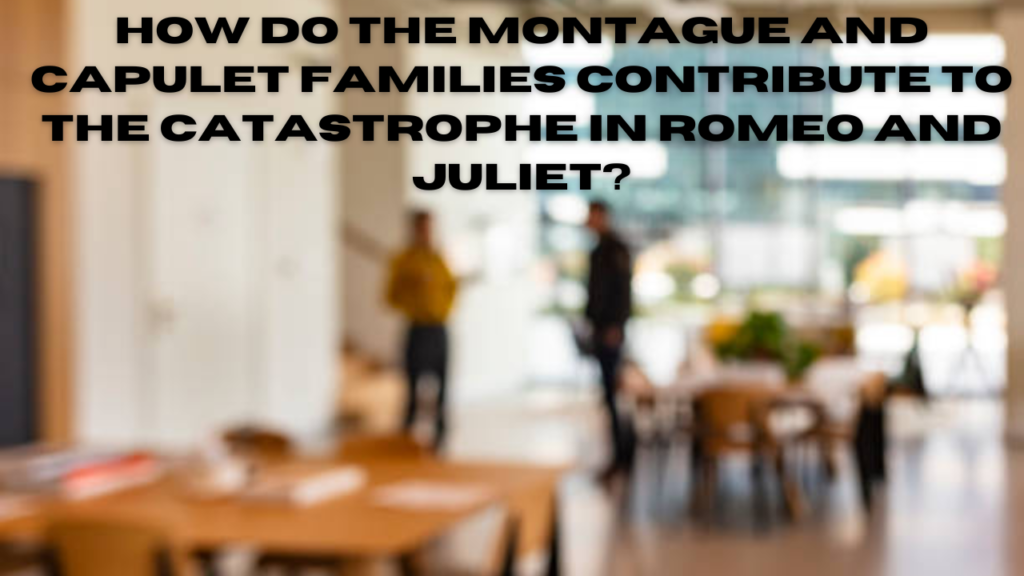The tragic tale of Romeo and Juliet by William Shakespeare unfolds against an intense and long-standing feud between two noble families, the Montagues and the Capulets. Their enmity is the primary catalyst for the series of unfortunate events that lead to Romeo and Juliet’s untimely deaths. This article explores how the actions, attitudes, and conflicts of these two families significantly contribute to the play’s catastrophic ending.
The Feud: A Foundation of Hatred
The bitter feud between the Montagues and the Capulets is at the core of the tragedy. This animosity is deeply ingrained in the families’ identities, shaping their behavior and decisions throughout the play. The intensity of their hatred creates an environment where violence and discord thrive, directly impacting Romeo and Juliet’s relationship. How do the Montague and Capulet families contribute to the catastrophe in Romeo and Juliet? Their feud makes it impossible for the young lovers to pursue their love openly, forcing them into secrecy and risky plans.
From the play’s opening scene, the audience witnesses the destructive consequences of the feud. A street brawl between servants of both families establishes the pervasive hostility that dominates Verona. Prince Escalus’s warning to the families after this altercation (“Your lives shall pay the forfeit of the peace”) foreshadows the tragic cost of their ongoing conflict. Yet, neither family heeds this warning, and the cycle of hatred continues.
Violence: A Perpetual Cycle of Retribution
Violence is a recurring theme in Romeo and Juliet, and much of it stems from the feud between the Montagues and the Capulets. This unrelenting aggression escalates the stakes for Romeo and Juliet, placing them in constant danger. Tybalt, Juliet’s fiery cousin, embodies this violence. His aggressive nature and loyalty to the Capulet name lead him to confront Romeo at every opportunity. When Tybalt kills Mercutio in a heated duel, Romeo retaliates by killing Tybalt, setting off a chain of events culminating in Romeo’s banishment.
Romeo’s exile is a direct consequence of the feud’s violent legacy. With Romeo banished from Verona, the lovers’ ability to be together is further complicated, pushing Juliet to seek desperate measures to avoid a forced marriage to Paris. Thus, the violence the Montagues and Capulets perpetuate is pivotal in driving the plot toward its tragic conclusion.

Obstruction of Love: Parental Control and Societal Expectations
Another significant way how the Montague and Capulet families contribute to the catastrophe in Romeo and Juliet is through their refusal to accept or even acknowledge the love between Romeo and Juliet. The rigid expectations of family loyalty and the desire to maintain social status prevent the families from considering reconciliation. Juliet’s father, Lord Capulet, exemplifies this obstruction when he insists she marry Paris, dismissing her protests and threatening disownment.
This lack of understanding and empathy from both families leaves Romeo and Juliet with no choice but to seek refuge in secrecy. Friar Laurence’s plan to fake Juliet’s death is born from the impossibility of the lovers openly defying their families. The extreme measures they resort to underline the devastating consequences of the families’ obstinate opposition.
Lack of Communication: A Barrier to Resolution
The Montague and Capulet families’ failure to communicate effectively exacerbates the situation. Their unwillingness to engage in dialogue perpetuates misunderstandings and prevents any chance of resolving their differences. Even within each family, communication breakdowns lead to disastrous outcomes. For instance, Juliet feels isolated and unsupported when her parents dismiss her pleas to delay her marriage to Paris. Similarly, Romeo receives incomplete information about Juliet’s situation, leading him to believe she is dead.
This lack of open communication is a stark reminder of how the inability to bridge divides and seek understanding can have fatal consequences. The families’ mutual silence and refusal to negotiate peace until too late highlight their role in the catastrophe.
The Tragic End: Lessons from the Feud
The deaths of Romeo and Juliet serve as the ultimate indictment of the Montague and Capulet feud. Only after the loss of their children do the two families recognize the futility and destructiveness of their hatred. The shared grief over the young lovers’ deaths finally prompts a reconciliation, but this resolution comes at an irreparable cost.
How do the Montague and Capulet families contribute to the catastrophe in Romeo and Juliet? Their actions and inactions create an environment where love cannot thrive, and violence becomes the default solution to conflicts. The feud’s impact extends beyond Romeo and Juliet, claiming the lives of Mercutio, Tybalt, and Paris and leaving a trail of sorrow and regret.

Also Read: Photeeq Lens Flare: The Art of Creative Light in Photography
Final Reviews: A Cautionary Tale of Hatred and Reconciliation
The tragedy of Romeo and Juliet underscores the devastating consequences of unbridled hatred and the importance of reconciliation and understanding. The Montague and Capulet families’ enmity is not just a backdrop but a driving force behind the play’s tragic events. Their inability to set aside their differences and prioritize love over hatred leads to irreversible loss.
As readers and audiences reflect on this timeless story, they are reminded of the value of compassion, communication, and the pursuit of peace. Shakespeare’s work remains a powerful testament to the dangers of holding onto grudges and the necessity of breaking the cycle of conflict. Ultimately, the lessons learned from the Montague and Capulet feud are as relevant today as they were in Shakespeare’s time.











